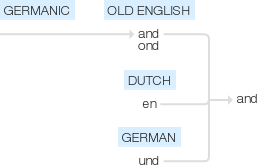And
Old English and, ond, of Germanic origin; related to Dutch en and German und .
wiktionary
From Middle English and, an, from Old English and, ond, end, from Proto-Germanic *andi, *anþi, from Proto-Indo-European *h₂énti(“facing opposite, near, in front of, before”). Cognate with Scots an(“and”), North Frisian en(“and”), West Frisian en, in(“and”), Low German un(“and”), Dutch en(“and”), German und(“and”), Danish end(“but”), Swedish än(“yet, but”), Icelandic enn(“still, yet”), Albanian edhe(“and”) (dialectal ênde, ênne), ende(“still, yet, therefore”), Latin ante(“opposite, in front of”), and Ancient Greek ἀντί(antí, “opposite, facing”).
From Middle English ande, from Old English anda(“grudge, enmity, malice, envy, hatred, anger, zeal, annoyance, vexation; zeal; injury, mischief; fear, horror”) and Old Norse andi(“breath, wind, spirit”); both from Proto-Germanic *anadô(“breath, anger, zeal”), from Proto-Indo-European *h₂enh₁-(“to breathe, blow”). Cognate with German Ahnd, And(“woe, grief”), Danish ånde(“breath”), Swedish anda, ande(“spirit, breath, wind, ingenuity, intellect”), Icelandic andi(“spirit”), Albanian ëndë(“pleasure, delight”), Latin animus(“spirit, soul”). Related to onde.
From Middle English anden, from Old English andian(“to be envious or jealous, envy”) and Old Norse anda(“to breathe”); both from Proto-Germanic *anadōną(“to breathe, sputter”). Cognate with German ahnden(“to avenge, punish”), Danish ånde(“to breathe”), Swedish andas(“to breathe”), Icelandic anda(“to breathe”). See above.
etymonline
and (conj.)
Old English and, ond, originally meaning "thereupon, next," from Proto-Germanic *unda (source also of Old Saxon endi, Old Frisian anda, Middle Dutch ende, Old High German enti, German und, Old Norse enn), from PIE root *en "in."
Introductory use (implying connection to something previous) was in Old English. To represent vulgar or colloquial pronunciation often written an', 'n'. Phrase and how as an exclamation of emphatic agreement dates from early 1900s.
